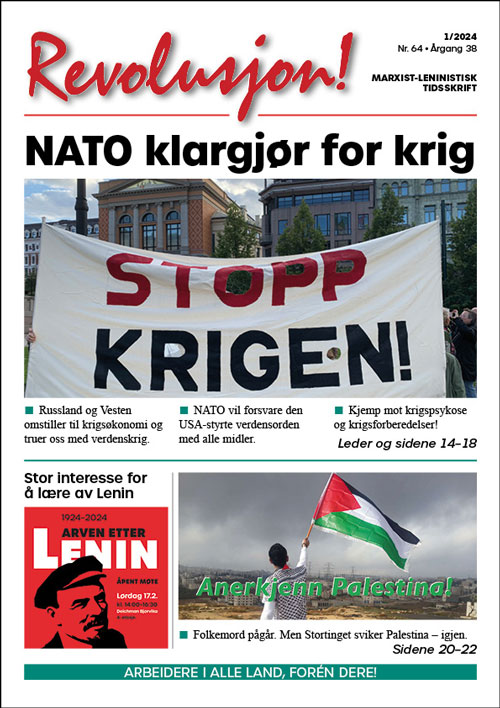The ruling class is trying to blame immigrant workers and refugees for the ongoing disintegration of social security and workers rights, claiming that social welfare will be "unsustainable".
 With the inauguration of Sylvi Listhaug (Progress Party) [1] as immigration minister the most reactionary forces now have a mouthpiece who underpins racial and cultural prejudices with an impact that the untalented fascist and racist organizations could only dream of. Migrant workers and refugees are blamed for almost everything.
With the inauguration of Sylvi Listhaug (Progress Party) [1] as immigration minister the most reactionary forces now have a mouthpiece who underpins racial and cultural prejudices with an impact that the untalented fascist and racist organizations could only dream of. Migrant workers and refugees are blamed for almost everything.
Allegedly social security, welfare and social rights “will be unsustainable” in the future. In this way the ruling class tries to divert the people's resistance to the systematic liquidation of social security standards that different governmenets have funneled since the beginning of this century, i.e. long in advance of “the refugee crisis”.
The danger with the fascist and ultra-reactionary forces is that they appeal to real concerns and popular ”common sense”. They do so by finding a grain of truth that is blown up out of proportion. Nonetheless, it has effect. And the forces of the left will be swept off the pitch if they simply repeat robot-like that mass immigration of refugees or labourers does not represent any problem whatsoever. The problem is factual and multifaceted. It requires a concrete and progressive response.
The facts show that refugees from the Middle East or Africa so far have not played any significant role in lowering the standards for wages and working conditions. Instead it was the EU/EEA[2] enlargement in 2004, which took effect in Norway from 2009, that gave impetus to social dumping. A significant reason for this is that many Eastern European workers do not find reason to organize in trade unions and pay membership fees, or they do not want to take the risk (of losing their job). A preliminary solution to this has been to make the collective bargaining agreements (CBA) universal[3] in some of the most vulnerable sectors, a measure that objectively further lessens the immigrant workers’ imperative to get organized. The impact of this measure when it comes to limiting wage dumping has also been relatively minor, according to a comprehensive report from 2015. The same report also shows that the organizational level is on the decline (especially in the building and construction sector), and that the bargaining power of workers thus has been considerably weakened. This has severe implications.
"During pre-revolutionary conditions the class struggle manifests itself as a guerrilla war in which the working class achieves economic and social concessions from the bourgeoisie for shorter or longer periods. These concessions, which will always be of a temporary nature, are recognized within the framework of national laws and in collective agreements."
The entire working class has the entire international bourgeoisie class as its enemy. Simultaneously, the working class in each country is fighting against its "own" bourgeoisie. During pre-revolutionary conditions the class struggle manifests itself as a guerrilla war in which the working class achieves economic and social concessions from the bourgeoisie for shorter or longer periods. These concessions, which will always be of a temporary nature, are recognized within the framework of national laws and in collective agreements.
Only through a strong class community, in practice through determined unions who are able to negotiate monopoly prices for labour in certain industries and companies, it is possible to prevail and defend victories like these. Groups of migrant workers who are accustomed to far lower standards and poorer conditions and are willing to undercut the country's own workers, thereby undermine the agreements and arrangements achieved. Herein lies the dilemma for the national labour movement, a dilemma capital of course is eager to exploit.
In what manner the working class of a country responds to this challenge depends on the degree of organization and of how developed their class consciousness is. On the one hand, the numbers organized in trade unions in Norway is quite high (totalling more than 50 %, and higher than this in industrial sectors), on the other hand their class consciousness has become increasingly impaired as a result of class collaboration and the economist and political hegemony of reformism. This low class consciousness is further depleted when the working class is expanded with new groups of workers who come from countries with few and weak organized labour traditions.
The progressive response from a class-conscious labour movement cannot be unrestrained "open borders" as preached by the ultra left and Trotskyites. That is naivety. Solidarity is something that needs to go both ways. The answer can only be to welcome all class brothers from other countries, but under the condition that they show mutual solidarity and do not allow themselves to be used to weaken the social and labour rights that have been achieved.
In practice this means that they must be part of the workers’ collective. The political demand can therefore not be other than that a work permit should be authorized only to those who are employed in businesses with a CBA. This must apply regardless of whether the work force comes from the EEA/EU area or not, and it must of course also apply to the temporary work agencies. It is urgent to implement such a line, before the union movement has been so weakened that it is not able to enforce it.
Editorial in Revolution No. 48, Spring 2016.
Endnote: This editorial deals mostly with immigrant workers from the EU/EEA Area and their effect on the work force market, and less with refugees seeking asylum under international laws and conventions. The level of trade union membership is high in Norway compared to most countries in Europe. For this reason, Marxist-Leninists in other countries may have a different approach concerning the question of immigrant workers.
[1] The Progress Party (Fremskrittspartiet) is in a government coalition with the Conservative party (Høyre). It is an ultra-liberalist, populist right-wing party with a xenophobic rhetoric.
[2] The European Economic Area (EEA) Agreement is an extension of the European Inner Market (including free migration of labour) to non-EU countries like Norway and Iceland.
[3] Due to the traditional strength of the trade unions, there is no minimum wage legislation in Norway. It is the minimum CBA standards that in some sectors are universalized.

